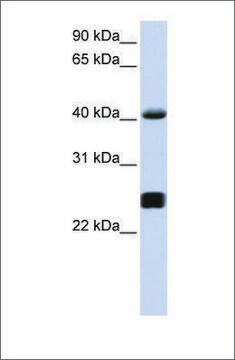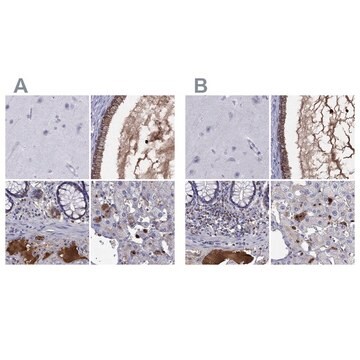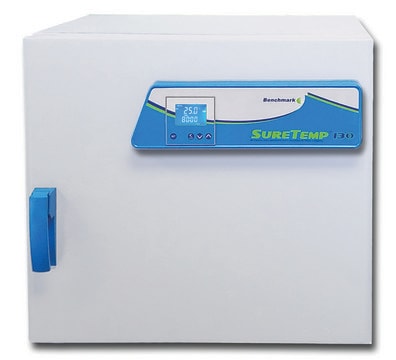추천 제품
생물학적 소스
hamster (Armenian)
Quality Level
항체 형태
purified antibody
항체 생산 유형
primary antibodies
클론
13H5, monoclonal
종 반응성
mouse
반응하면 안 됨
human
기술
immunofluorescence: suitable
western blot: suitable
NCBI 수납 번호
UniProt 수납 번호
배송 상태
ambient
타겟 번역 후 변형
unmodified
유전자 정보
mouse ... Serpina3N(20716)
일반 설명
Serine protease inhibitor A3N (UniProt: Q91WP6; also known as Serpin A3N) is encoded by the Serpina3n (also known as Spi2) gene (Gene ID: 20716) in murine species. SerpinA3N is a secreted protein of the serpin family. Serpins bind and inhibit specific serine proteases and several serine proteases are reported to be substrates for SerpinA3N in vitro. It is synthesized with a signal peptide of 20 amino acids that is cleaved to generate the mature protein. SerpinA3N is expressed at high levels in brain, heart, liver, lung, spleen, testis, and thymus. However, its expression is low in kidney, skeletal muscle, and bone marrow. Serpin A3N expression can also be induced by bacterial lipopolysaccharides. The reactive center loop (RCL) of as SerpinA3N extends out from the body of the protein and directs binding to the target protease. The protease cleaves the serpin at the reactive site within the RCL, establishing a covalent linkage between the serpin reactive site and the protease. The resulting inactive serpin-protease complex is highly stable. SerpinA3N is shown to be up-regulated in the dorsal root ganglia after nerve injury and mice lacking SerpinA3N are reported to develop more neuropathic mechanical allodynia than wild-type (WT) mice. SerpinA3N is also shown to attenuate activated T cell-mediated neuronal death and reduce the severity of disease in experimental autoimmune encephalomyelitis (EAE). (Ref.: Vicuna, L et al. (2015) Nat. Med. 21(5):518-23).
특이성
Clone 13H5 specifically targets murine Serpina3n. It is predicted to react with both pro- and mature forms of Serpina3n. This clone targets a sequence within 24 amino acids from the C-terminal region.
면역원
KLH-conjugated linear peptide corresponding to 24 amino acids from the C-terminal region of murine Serpina3n.
애플리케이션
Detect Serpina3n using this armenian hamster monoclonal Anti-Serpina3n Antibody, clone 13H5, Cat. No. MABC1182. It has been tested for use in Immunofluorescence and Western Blotting.
Immunofluorescence Analysis: A representative lot detected increased Serpin A3N/Serpina3n immunoreactivity in late metastasis stage lung tissue by fluorescent immunohistochemistry staining of paraformaldehyde-fixed frozen lung sections in a study employing the murine MMTV-PyMT breast-to-lung metastasis model (Sevenich, L., et al. (2014). Nat. Cell Biol. 16(9):876-888).
Research Category
Apoptosis & Cancer
Apoptosis & Cancer
품질
Evaluated by Western Blotting in mouse brain tissue lysate.
Western Blotting Analysis: 0.5 µg/mL of this antibody detected Serpina3n in 10 µg of mouse brain tissue lysate.
Western Blotting Analysis: 0.5 µg/mL of this antibody detected Serpina3n in 10 µg of mouse brain tissue lysate.
표적 설명
~46 kDa observed; 46.72 kDa calculated. Uncharacterized bands may be observed in some lysate(s).
물리적 형태
Format: Purified
Protein G purified
Purified armenian hamster monoclonal antibody in buffer containing 0.1 M Tris-Glycine (pH 7.4), 150 mM NaCl with 0.05% sodium azide.
저장 및 안정성
Stable for 1 year at 2-8°C from date of receipt.
기타 정보
Concentration: Please refer to lot specific datasheet.
면책조항
Unless otherwise stated in our catalog or other company documentation accompanying the product(s), our products are intended for research use only and are not to be used for any other purpose, which includes but is not limited to, unauthorized commercial uses, in vitro diagnostic uses, ex vivo or in vivo therapeutic uses or any type of consumption or application to humans or animals.
Not finding the right product?
Try our 제품 선택기 도구.
Storage Class Code
12 - Non Combustible Liquids
WGK
WGK 1
시험 성적서(COA)
제품의 로트/배치 번호를 입력하여 시험 성적서(COA)을 검색하십시오. 로트 및 배치 번호는 제품 라벨에 있는 ‘로트’ 또는 ‘배치’라는 용어 뒤에서 찾을 수 있습니다.
Mehwish Saba Aslam et al.
BioMed research international, 2022, 1557010-1557010 (2022-06-10)
Ischemic stroke is a devastating CNS insult with few clinical cures. Poor understanding of underlying mechanistic network is the primary limitation to develop novel curative therapies. Extracellular accumulation of granzyme B subsequent ischemia promotes neurodegeneration. Inhibition of granzyme B can
자사의 과학자팀은 생명 과학, 재료 과학, 화학 합성, 크로마토그래피, 분석 및 기타 많은 영역을 포함한 모든 과학 분야에 경험이 있습니다..
고객지원팀으로 연락바랍니다.








